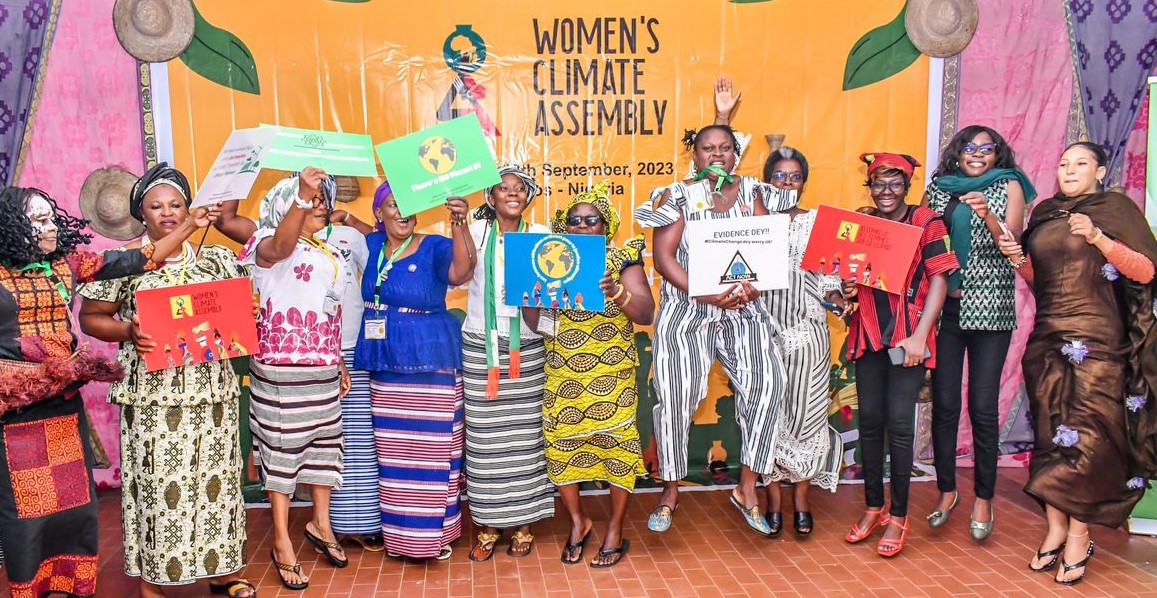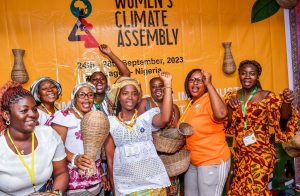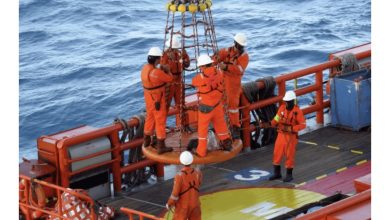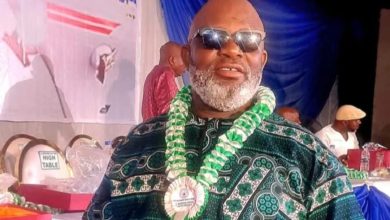African Women Mobilise for Climate Justice, Reparations, Development Alternatives
Reject False Solutions to Climate Crisis, Failure of Addressing Challenges at COPs

Ahead of the twenty-eighth edition of the Committee of Parties (COP28) slated for Dubai from November 30, 2023 to December 12, 2023, African women under the aegis of the Women’s Climate Assembly (WCA) have canvassed more effective ways of combating climate change, which they said, has been affecting them extremely negatively.
Drawing attention to what they describe as ‘false solutions’ to the climate change crisis over the years, they said the African continent, especially its women, have become weary of talks without concrete action, which has been the lot of all COPs, insisting that African women were ready to take the lead since governments and industry players have failed to mitigate the negative impacts of climate change on the continent.
 Speaking at the second WCA summit in Lagos from September 24, 2023 to September 28, 2023, following the first meeting in Port Harcourt, Rivers State in 2022, representatives of women groups, fossil fuel and mining communities, as well as environmental activists from no fewer than 15 African countries, demanded immediate action to tackle the climate change crisis and save the continent from extinction.
Speaking at the second WCA summit in Lagos from September 24, 2023 to September 28, 2023, following the first meeting in Port Harcourt, Rivers State in 2022, representatives of women groups, fossil fuel and mining communities, as well as environmental activists from no fewer than 15 African countries, demanded immediate action to tackle the climate change crisis and save the continent from extinction.
In her address, Emem J. Okon, Executive Director of Kebetkache Women Development and Resource Centre, organisers of the summit holding at the Digital Bridge Institute (DBI) in Oshodi, Lagos, said: “The essence of the WCA is to mobilise African women under the Africa Women Alliance and the WCA to discuss issues of climate change, where we will be discussing the major countries and corporations causing climate change globally and champion ways of mitigating the impacts of climate change.
 “This assembly is part of the counter COP to brainstorm on the very devastating effects of climate change globally, even at the COP28, slated for Dubai from November 30, 2023 to December 12, 2023.
“This assembly is part of the counter COP to brainstorm on the very devastating effects of climate change globally, even at the COP28, slated for Dubai from November 30, 2023 to December 12, 2023.
“For all African women fighting for climate justice, the WCA is a crucial political space for education, activism, camaraderie and movement building. The Assembly will give over 100 community activists and leaders from over 15 countries the opportunity to learn, build mutual understanding and solidarity, teach one another, craft political solutions to address their interests and most importantly, make women who carry the costs of the climate crisis visible!”
In an interview with journalists, National Steering Committee member of WCA from Akwa Ibom State, Glory Alexander-Thomas, said the negligence of industry players and the Federal Government regarding the plight of oil producing communities of the Niger Delta has become a nightmare, as residents of the region continue to bear the brunt of the environmental hazards caused by oil extraction and exploration activities in the region.
 “So ‘The Earth Bleeds Where The Oil Flows,’ a poem written by environmental activist, Nnimmo Bassey, is to capture the very essence of the situation we found ourselves in the oil producing communities of the Niger Delta, especially the women who bear the brunt of the negative impacts of the activities of multinational oil companies, which care less of what their activities have caused and are causing the people individually and collectively.”
“So ‘The Earth Bleeds Where The Oil Flows,’ a poem written by environmental activist, Nnimmo Bassey, is to capture the very essence of the situation we found ourselves in the oil producing communities of the Niger Delta, especially the women who bear the brunt of the negative impacts of the activities of multinational oil companies, which care less of what their activities have caused and are causing the people individually and collectively.”
A women community leader from Okwuji Community in Ogba/Egbema Council of Rivers State, Mrs. Shepherdess Peace Mgbenwa, lamented that since the Nigeria Agip Oil Company (NAOC), started prospecting for oil and gas in the community since 1956, life has remained unbearable for the locals.
In her words: “Okwuji was a peaceful, agrarian community of mostly farmers and fishermen, but we lost that serenity to activities of oil exploration decades ago. Our yams and cassava, as well as fishing activities no longer yield the desired outcomes, as oil spillages and other pollution impacts have practically incapacitated the entire community.
“As things stand, we no longer have a means of livelihood. Worse still, the kind of change in our climate and environment makes one wonder if we still have a future. These days, we no longer have what used to be “August Break,” during which we engage in a small planting season.
“Even the flooding, which has become the order of the day, has compounded our woes in that every year now, we are buffeted by floods to the extent that our people now have to move at least three times from place to place and finally to Internally Displaced Persons Camps (IDPs) before the floods recede each year.
“We, therefore, plead with the government at all levels and the oil and gas industry to do the right things before our communities are wiped away.”
Also, Cynthia Buluebiere Bright from Gelegele Community in Ovia North East Council of Edo State, lamented that in Gelegele Community, gas flaring has been ongoing since 1966 at the centre of the town, to the extent that women and children, especially girls, have been subjected to various types of heart-related ailments, cancers and skin diseases.
“The issue of climate change has become a very serious global issue. From my experience in Gelegele Community, the gas being flared is at the heart of the town, the women now have cancers, heart diseases, partial blindness, miscarriages and all types of skin diseases. But having been empowered by the Kebetcache summit, we need to let our governments know that they have been giving us false solutions and we are saying NO to such false solutions at the local, national and global levels.
“Right now, mother earth is bleeding and since the woman represents mother earth, we are saying that they should leave the oil in the soil, because the situation is getting so bad that our people are dying. And so, the Women Climate Assembly is saying that the Federal Government and industry players should stop all extractive activities, gas flaring and make life more meaningful for residents of the oil producing host communities.
“They should stop all activities impacting negatively on the natural environment and do the right things, as against focusing on making money and profits to the detriment of lives and property of Africans, whose only sin happens to be the natural resources God blessed them with.”
Apart from Nigeria, other women drawn from Ghana, Benin Republic, Burkina Faso, Cote d’Ivoire, Cameroun, the Democratic Republic of Congo, Guinea Conakry, Liberia, Mali, Senegal, Sierra Leone and Zimbabwe, among others, shared the same sentiments with their Nigerian counterparts, insisting that the climate change challenge was becoming overbearing and needed to be tamed, as quickly as possible.
Speaking, Josiane Yebi Boyo from Cote d’Ivoire said: “The strength of women climate assemblies is in their commitment to leaving no one behind, ensuring that the most vulnerable are not part of the conversation, but also the solution.”
For Senegal’s Mariama Sanko: “Grassroots women defending their environment and fighting for climate justice are the true heroes of our time, and working tirelessly to heal our planet earth and secure a brighter future for all…is a task that must be pursued with passion and accomplished.”












